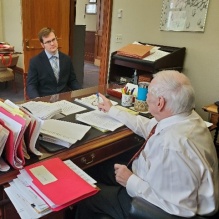
Ethan Berg '26
Blanche Gische and Helen Schurkman Fellowship Award for Elder Justice
Organization: Erie County Surrogate's Court
How would you describe your experience?

My Erie County Surrogate's Court internship has been instructional about (1) what is best practice as a trusts and estates [T&E] attorney, and (2) a public interest issue requiring remedy by T&E attorneys.
Observing evidentiary hearings and reading submitted papers for pending cases has provided me with lessons about what is best practice. These lessons include drafting precisely worded wills to avoid legal controversies, organizing pleadings around the case and statutory law, editing pleadings and other submitted papers to avoid typos and misapplication of the law, conducting evidentiary hearings around the structure of pleadings, and having a mastery over the record when seeking a court order. I worked on pending cases, for instance an estate accounting case, where much of the above was not done, resulting in a slow decision-making process which produced undesirable legal outcomes.
My observations during the internship also revealed a serious public interest issue: the frequent participation of ill-informed pro-se litigants who could not afford, or should not pay for, legal counsel. I consistently observed that pro-se litigants did not understand the law to the detriment of their legal interests. For example, during a daily calendar call, a pro-se litigant failed to understand the probate process and ultimately rested on his defective objections which discussed alleged wrongs but did not equate to undue influence upon the testator. He made his decision mistakenly feeling he had no other choice. In another case, a pro-se litigant sought to establish her spousal relationship to the decedent during a kinship hearing. She did not understand the rules of questioning a witness and of admitting evidence. As a result, she failed to reinforce her legal argument with testimony and supporting documentary evidence.
These pro-se litigants often are too poor to afford an attorney. Even if they could afford one, the estates' small sizes make paying for legal counsel financially unwise. Pro-se litigants are forced into situations where their inheritance is lost due to their lack of legal knowledge, undermining generational social mobility. The Court cannot provide free counsel to all of them because such an unfettered right is reserved for those facing the deprivation of their legal rights and property, not for those trying to gain property. I thus realized that T&E attorneys, through their pro-bono work, are the ones who must remedy this public interest issue.
What impacted you the most?
The most impactful aspect of my Erie County Surrogate's Court internship was observing and participating in the Court's decision-making process. This is what primarily informed me about what is best practice as a trusts and estates [T&E] attorney. This experience gave me insight on how poorly organized pleadings unnecessarily slow the decision-making process. For instance, in an estate accounting case, I spent nearly a week reorganizing objections from a free-flowing narrative into individual legal arguments. Only then, could I start analyzing the record and find relevant case and statutory law which would decide that case. In another instance, I worked on a judicial settlement case where the procedural history was not presented to the Court in a coherent manner. Multiple petitions were filed, amended, and not clearly distinguished in the record. This made identifying pending issues before the Court unnecessarily time-consuming.
This experience also gave me insight into how not conducting evidentiary hearings around the structure of hearings unnecessarily slows the decision-making process and, furthermore, produces undesirable legal outcomes. For instance, in the aforementioned estate accounting case, the questioning during the 2211 hearings was not conducted to have the witness give answers relevant for each objection and their supporting allegation(s). Instead, it was a free-flowing stream of questioning which touched on various objections and even irrelevant issues. As a result, the record did not address many of the objections, resulting in undesirable legal outcomes for the objectant.
In short, observing and participating in the Court's decision-making process, taught me how to be a T&E attorney who expedites the decision-making process for the Court and who effectively advocates for their client by ensuring the record touches on all objections in a clear and coherent manner. A T&E attorney needs to acclimate their advocacy to the Court's decision-making process. The internship gave me knowledge and experience to be able to achieve this acclimation.
What would you like to share with our donors?
I want my donors to know how much I appreciate their financial support for my Erie County Surrogate's Court internship through the Blanche Gische and Helen Schurkman Fellowship Award for Elder Justice. It provided me financial security which covered my travel and living expenses so I could commit four days a week to the Court. This level of time commitment was necessary for having my takeaways from this internship, which I shared with you in this report. I otherwise would not have been entrusted with working so extensively on pending complex cases where I learned what is best practice as a trusts and estates [T&E] attorney. I also otherwise would not have had the same number of observations which led me to the conclusion that there is frequent participation of ill-informed pro-se litigants who cannot afford, or should not pay for, legal counsel. I hope my insight on this serious public interest issue and my proposed remedy for it in the T&E area of law, was informative. This insight has served as advice to myself on how to fulfill my own pro-bono hours as a future T&E attorney so that those hours serve a higher purpose of preserving generational social mobility.